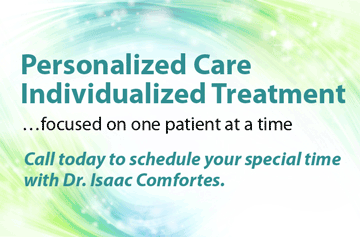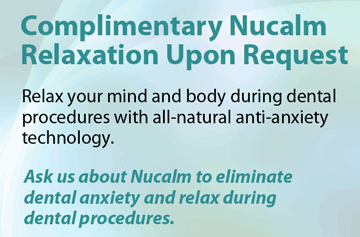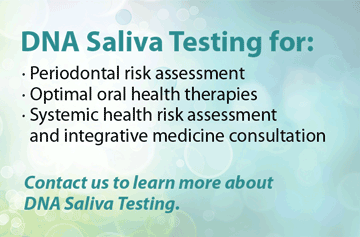Treatment of Obstructive Sleep Apnea
Obstructive sleep apnea (OSA) has been linked to significant health consequence. If you suffer from snoring and sleep apnea, it is important to seek treatment as soon as possible. Although many medical practitioners still use CPAP machines to treat sleep apnea, treatment of obstructive sleep apnea with oral appliance therapy is growing in popularity because it is more comfortable, portable, cost-effective, and leads to more patient compliance. A dentist who has developed expertise in the treatment of OSA with oral appliance therapy (OAT), is the place to seek this type of treatment. Fortunately for L.A. residents, Total Health Dentistry of Encino has such a dentist. Dr. Isaac Comfortes has successfully treated patients, who are now healthier, more energetic, and likely to lead a much longer life.
What is sleep apnea?
There are two varieties of sleep apnea. Central sleep apnea (CSA) is rather uncommon. This condition will arise if your brain does not send the proper signals to stimulate breathing during sleep. Obstructive sleep apnea (OSA) is more common. When you are asleep, your whole body falls into a deep relaxation. However, if your throat, tongue, or soft palate slacken too much, the tissues can block the flow of air through your windpipe. In response, you will wake up or emerge from the deeper stages of sleep, meaning you will never get the full night’s rest that your body needs. Snoring may be a primary sign that sleep apnea is occurring, and the patient or sleeping partner may or may not be aware of it. Be aware of the signs of OSA. These include:
- Loud snoring
- Chronic daytime fatigue
- Headaches
- Mood swings
- Forgetfulness
- A lowered libido
- Chronic sore or dry throat in the morning
OSA and Elevated Blood Pressure
Although these side effects can certainly make life less pleasant, there are even greater concerns associated with sleep apnea. If you suffer from OSA, you face a significantly higher risk for high blood pressure, heart attack, and stroke. There is no doubt about the connection between these conditions. As the oxygen level in your body falls, receptors that alert the brain become excited. In response, the brain sends signals through the nervous system and essentially tells the blood vessels to “tighten up” to increase the flow of oxygen to the heart and the brain. Fortunately, there seems to be a two-way connection; treating OSA reduces blood pressure and may enable you to cut back on your blood pressure medication.
Sleep Apnea and Your Heart Health
High blood pressure will increase your risk for heart attack and stroke. Therefore, if you have OSA, you will face a higher risk for cardiovascular problems and premature death. However, many experts believe that repeated disruptions to your sleep can also raise your risk for these problems independent of blood pressure levels. Because your brain will not receive a steady flow of oxygen, it can impair your brain’s ability to regulate heart beats. In turn, this can lead to stroke and atrial fibrillation (chronic heart irregularity). Fortunately, sleep apnea treatment can greatly reduce these risks. According to the National Sleep Foundation, only 40% of patients with OSA and atrial fibrillation will need treatment for their heart condition after being treated for sleep apnea.
Weight and Diabetes
The International Diabetes Federation states that 40% of people with obstructive sleep apnea also suffer from diabetes. However, researchers caution that this does not necessarily indicate a causal relationship. Obesity is a common risk factor for both conditions, and losing weight may help to control both OSA and diabetes. Nevertheless, other scientists speculate that sleep apnea may make it more difficult to control weight and blood sugar. Lack of sleep can make your body more resistant to insulin. It can also increase the likelihood of weight gain.
Daytime Sleepiness
Of course, chronic fatigue will affect your productivity, professional success, and happiness. However, it could also have life threatening consequences. According to the National Thoracic Society, patients with untreated OSA are two to three times more likely to be in a car accident than patients without sleep apnea. The society does not advocate restricting patient’s driving privileges, provided they have not had an OSA-related accident. However, if you suffer from the condition, the researchers do advise you to seek treatment as soon as possible. Doing so will not only protect your life; it could also save the lives of others out on the road.
Treating Your Sleep Apnea
CPAP (Continuous Positive Airway Pressure) machines are one way of treating sleep apnea. However, these bulky devices can be uncomfortable and inconvenient. Many patients find that they cannot get used to CPAP machines, and they continue to experience disrupted sleep. If you have not found success with a CPAP machine, or if you would like to begin with a more conservative option, Dr. Isaac Comfortes can provide you with an oral appliance. This small, custom-made device will fit over your teeth and reposition your lower jaw. As the jaw is held forward, the soft palate will tighten and prevent your tongue from drooping into your airways. The custom-fit appliance that Dr. Comfortes will use will be adjustable so the position of your lower jaw can be adjusted for optimal effectiveness and comfort.
An April 2017 research review article in The Journal of Dental Sleep Medicine compared the efficacy and effectiveness of CPAP and OAT. Although CPAP treatment has been demonstrated to be the most effective therapy for preventing obstructive breathing events and improving nighttime oxygen saturation, OAT therapy has been demonstrated to have the same level of beneficial health results. This is thought to be because, patients more willingly comply with OAT usage and regularly wear their appliance.
See our obstructive sleep apnea expert, Isaac Comfortes, D.D.S.
Adjustable oral appliances that open the airway are a very effective alternative to CPAP machines for most patients. If you have any signs of obstructive sleep apnea, Dr. Comfortes would like to help you improve the quality and longevity of your life through accurate diagnosis, comfortable custom-fit and adjusted appliance therapy, and monitoring the effects of this therapy. In collaborate with your physicians, Dr. Comfortes can help you maximize your overall systemic health through the regular flow of oxygen into your lungs all through the night.
We invite you to schedule an obstructive sleep apnea treatment consultation with Dr. Comfortes at Total Health Dentistry of Encino.





 The general, cosmetic and reconstructive dental practice of Encino dentist Dr. Isaac Comfortes is devoted to restoring optimal oral health, which supports whole body health and enhances the natural beauty of smiles.
The general, cosmetic and reconstructive dental practice of Encino dentist Dr. Isaac Comfortes is devoted to restoring optimal oral health, which supports whole body health and enhances the natural beauty of smiles.